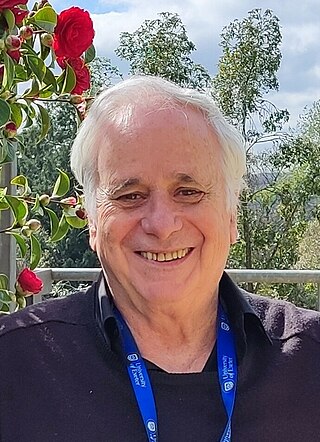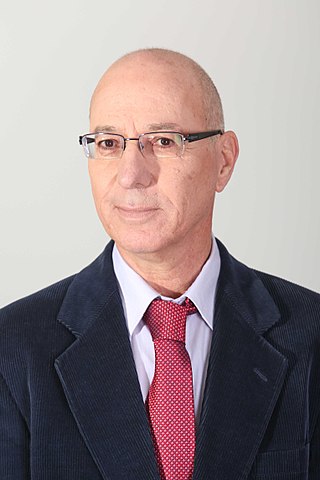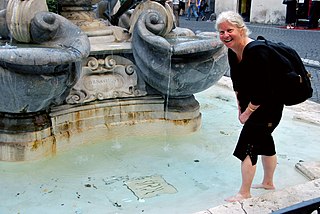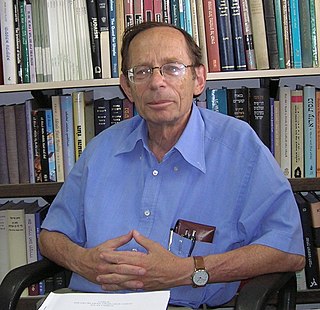Related Research Articles
Jewish religious movements, sometimes called "denominations", include diverse groups within Judaism which have developed among Jews from ancient times. Today in the west, the most prominent divisions are between traditionalist Orthodox movements and modernist movements such as Reform Judaism originating in late 18th century Europe, Conservative originating in 19th century Europe, and other smaller ones, including the Reconstructionist and Renewal movements which emerged later in the 20th century in the United States.

The Herbert D. Katz Center for Advanced Judaic Studies at the University of Pennsylvania, commonly called the Katz Center, is a postdoctoral research center devoted to the study of Jewish history and civilization.

Efraim Karsh is an Israeli and British historian who is the founding director and emeritus professor of Middle East and Mediterranean Studies at King's College London. Since 2013, he has served as professor of political studies at Bar-Ilan University. He is also a principal research fellow and former director of the Middle East Forum, a Philadelphia-based think tank. He is a vocal critic of the New Historians, a group of Israeli scholars who have questioned the traditional Israeli narrative of the Arab–Israeli conflict.
Lawrence Harvey Schiffman is a professor at New York University ; he was formerly Vice-Provost of Undergraduate Education at Yeshiva University and Professor of Jewish Studies. He had previously been Chair of New York University's Skirball Department of Hebrew and Judaic Studies and served as the Ethel and Irvin A. Edelman Professor in Hebrew and Judaic Studies at New York University (NYU). He is currently the Judge Abraham Lieberman Professor of Hebrew and Judaic Studies at New York University and Director of the Global Institute for Advanced Research in Jewish Studies. He is a specialist in the Dead Sea Scrolls, Judaism in Late Antiquity, the history of Jewish law, and Talmudic literature.
Religion in Israel is manifested primarily in Judaism, the ethnic religion of the Jewish people. The State of Israel declares itself as a "Jewish and democratic state" and is the only country in the world with a Jewish-majority population. Other faiths in the country include Islam, Christianity and the religion of the Druze people. Religion plays a central role in national and civil life, and almost all Israeli citizens are automatically registered as members of the state's 14 official religious communities, which exercise control over several matters of personal status, especially marriage. These recognized communities are Orthodox Judaism, Islam, the Druze faith, the Catholic Church, Greek Orthodox Church, Syriac Orthodox Church, Armenian Apostolic Church, Anglicanism, and the Baháʼí Faith.

Ilan Pappé is an Israeli historian, political scientist, and former politician. He is a professor with the College of Social Sciences and International Studies at the University of Exeter in the United Kingdom, director of the university's European Centre for Palestine Studies, and co-director of the Exeter Centre for Ethno-Political Studies. Pappé was also a board member of the Israeli political party Hadash, and was a candidate on the party list in the 1996 and 1999 Israeli legislative elections.

Anita Shapira is an Israeli historian. She is the founder of the Yitzhak Rabin Center, professor emerita of Jewish history at Tel Aviv University, and former head of the Weizmann Institute for the Study of Zionism at Tel Aviv University. She received the Israel Prize in 2008.
Hillel Halkin is an American-born Israeli translator, biographer, literary critic, and novelist who has lived in Israel since 1970.
Ronald W. Zweig is an Australian-Israeli historian specializing in Hebrew and Judaic studies, with particular reference to the British Mandate in Palestine. He is currently the Marilyn and Henry Taub Professor of Israel Studies at New York University (NYU).
Antisemitism at universities has been reported and supported since the medieval period and, more recently, resisted and studied. Antisemitism has been manifested in various policies and practices, such as restricting the admission of Jewish students by a Jewish quota, or ostracism, intimidation, or violence against Jewish students, as well as in the hiring, retention and treatment of Jewish faculty and staff. In some instances, universities have been accused of condoning the development of antisemitic cultures on campus.

Adam S. Ferziger is an intellectual and social historian whose research focuses on Jewish religious movements and religious responses to secularization and assimilation in modern and contemporary North America, Europe and Israel. Ferziger holds the Samson Raphael Hirsch Chair for Research of the Torah with Derekh Erez Movement in the Department of Jewish History and Contemporary Jewry at Bar-Ilan University, Ramat Gan, Israel. He is a senior associate at the Oxford Centre for Hebrew and Jewish Studies and is co-convener of the annual Oxford Summer Institute for Modern and Contemporary Judaism. He has served as a visiting professor/fellow in College of Charleston (2017), Wolfson College, University of Oxford, UK (2013), University of Sydney, New South Wales, Australia (2012), and University of Shandong, Jinan, China (2005). In 2011, he received Bar-Ilan's "Outstanding Lecturer" award. Ferziger has published articles in leading academic journals of religion, history, and Jewish studies and is the author or editor of seven books including: Exclusion and Hierarchy: Orthodoxy, Nonobservance and the Emergence of Modern Jewish Identity ; Orthodox Judaism – New Perspectives, edited with Aviezer Ravitzky and Yoseph Salmon ; and most recently Beyond Sectarianism: The Realignment of American Orthodox Judaism, which was the winner of a 2015 National Jewish Book Award.
Charles S. Liebman was an American political scientist and prolific author on Jewish life and Israel. A professor at Bar-Ilan University, he previously served on university faculties in the United States.

Ezra Danin was the head of the Arab section of the SHAI, the intelligence arm of the Haganah, Israeli politician and an orange grower. Danin specialized in Arab affairs.
Hiloni, plural hilonim, is a social category in Israel, designating the least religious segment among the Jewish public. The other three subgroups on the scale of Jewish-Israeli religiosity are the masortim, "traditional"; datiim, "religious"; and haredim, "ultra-religious" ("ultra-Orthodox"). In the 2018 Israel Central Bureau of Statistics' survey, 43.2% of Jews identified as hiloni.
Israel Studies is a triannual peer-reviewed academic journal covering the history, politics, society, and culture of the modern state of Israel. It was established in 1996 S. Ilan Troen as founding editor(Brandeis University). It is published by the Indiana University Press. The editors-in-chief are Arieh Saposnik, Natan Aridan, and S. Ilan Troen.

Yitzhak Reiter is an Israeli political scientist. He is a professor specializing in Israel studies and Islamic and Middle East history and politics, teaching at Reichman University and Al-Qasemi College. A senior researcher at the Jerusalem Institute for Policy Research, he formerly chaired the Department of Israel Studies at Ashkelon Academic College.

Tal Ilan is an Israeli-born historian, notably of women's history in Judaism, and lexicographer. She is known for her work in rabbinic literature, the history of ancient Judaism, the Dead Sea Scrolls, ancient Jewish historiography, Jewish epigraphy, archaeology and papyrology, onomastics, and ancient Jewish magic. She is the initiator and director of The Feminist Commentary on the Babylonian Talmud (FCBT). She received her education from the Hebrew University of Jerusalem. She is currently professor of Jewish Studies at the Free University of Berlin.

Ludwig Blum was a Moravian-born Israeli painter. He emigrated to Israel in 1923, as part of the Third Aliyah, and became known as "the painter of Jerusalem".

Gerald Blidstein was professor emeritus of Jewish philosophy at Israel's Ben-Gurion University of the Negev. He was the Israel Prize laureate in Jewish philosophy (2006) and had been a member of the Israel Academy of Sciences since 2007.

Ruth Halperin-Kaddari is an Israeli legal scholar and international women's rights advocate who is known for her work on family law, feminist legal theory, women's rights in international law, and women and religion. She was a member of the United Nations Committee on the Elimination of Discrimination against Women from 2006 to 2018, and was the committee's vice chair during several terms. She is Professor of Law at the Bar-Ilan University and is the founding Academic Director of the Ruth and Emanuel Rackman Center for the Advancement of the Status of Women. She is also involved in international academic collaborations on the theme of women, state, and religion, and participates in international litigations as an expert on Israeli family law.
References
- ↑ http://www.dailynewstribune.com/news/local_regional/walt_troen04222003.htm%5B%5D
- ↑ “How Secular or Democratic Can a Jewish State Be?” Archived 2006-10-29 at the Wayback Machine , Tufts-Fletcher-News, Tufts University, October 2002.
- ↑ Belasco, Daniel. "A Seat At The Table: With new chair at Brandeis, Israel studies taking its place in academia", The Jewish Week, 14 December 2001.